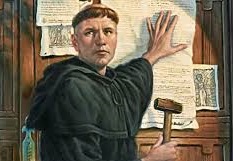A Special Day
By Anthony Casperson
10-31-20
Hey, you know what today is? (I’ll give you a hint. Look up a line or two for the date.)
I guess, yeah, many people would think of it as Halloween, but that’s not specifically what I’m thinking about. Sure, fans of stage magic might speak to how it’s the anniversary of Harry Houdini’s death. And, okay, potterheads will point out that it’s also the anniversary of Harry Potter’s parent’s death. Also, the other wizardly Harry from the Dresden Files celebrates his birthday today. And stepping away from the inordinate number of Harry’s who have connection to this day (who knew?), today is also the birthday of my dad, Roger.
But none of that is what I’m talking about. (Even though one of them is kinda important to me.)
Today is what’s often called the birthday of Protestantism. On this day in 1517, Martin Luther nailed his 95 theses to what was basically a public bulletin board and set him on a path that would lead to one of the largest (though not the first) divisions of those who claim Jesus as their Savior.
While many other individuals had a hand in guiding the mind of the German priest, and a number of his contemporaries had been edging toward similarly breaking with the Catholic Church of the time, it is to this date that most Protestants point as the beginning of the Reformation.
And though, Luther himself would point out that his actions that specific Wednesday (yeah, I looked it up) was only meant to reform an error in the Church rather than separate from it, and it was only later that the schism occurred, still we celebrate Reformation Day today.
I’ll leave it to Church historians to discuss the significance of this date as it pertains to the Reformation. But while remembering the actual deed of Luther, a random thought came into my mind: Why did he choose this day of the year?
I will never know the mind of Luther. However, I can’t help but wonder why he chose All Hallows’ Eve as the day he uploaded his old-fashioned blog.
First, I suppose, we should talk about what the 95 theses were. Technically, Luther titled the piece, “Disputation on the Power and Efficacy of Indulgences.” But that’s a bit much to have to repeat, so we’ll go with the much more popular and shorter name.
For those who read Scholar-ese, the title describes well the contents. For everyone else the translation of “Why You Can’t Pay to Win Your Way into Heaven” should suffice. Luther wrote out his stance for a debate against the church’s sale of indulgences. And publicly called people to discuss the issue.
Indulgences were deeply tied to the Catholic Church’s teaching of purgatory, a place where the sins that one committed after being baptized into Christ were purged from a person before they were allowed into heaven. (I personally, and Protestants in general, believe that every sin past, present, and future were paid by the cross of Jesus. Thus, there is no need for a purging of unpaid-for sins because every sin has already been taken care of. But I have to explain the teaching to clarify what Indulgences are.)
In what many Church historians would state was a push to gain capital to pay for a cathedral’s building, the sale of Indulgences came en vogue. They were sold as a means to shorten a person’s stay in purgatory, either the one who paid for it or one of their loved ones. Though more often than not, the sales were to help release a person’s dead loved ones from purgatory.
These Indulgences, according to Luther, reduced the role of true sorrow and repentance for one’s sins. After all, if you can just pay to win (or better yet have someone else pay) why spend countless hours pouring in energy to actually try to act holy? It short-changes the process of sanctification. And even is a bit of an affront to the justification brought about by the cross of Jesus.
Since we have a brief understanding of what the 95 theses are, we can look at why Luther might have chosen this day of the year to post them.
For us today, we often think of All Hallows’ Eve as Halloween, the night of witches and ghouls, of costumes and candy. But in Church history this day began a season known as Allhallowstide, a time when those in the Church would remember the dead, specifically martyrs, saints, and the faithfully departed.
November 1st is All Saints’ Day, the day to celebrate those who were canonized in the Catholic Church as saints, especially those who didn’t have a specific day of celebration already. (The Protestant part of me that believes the bible teaches that all who come into relationship with God through the cross of Jesus are the saints, the holy ones, of God [without having to be officially recognized as such] really just itched at that previous sentence.) And November 2nd is All Souls’ Day, the day to remember the dead who had lived faithfully for Christ.
So, why would Luther choose the first day of a season focused on the faithful dead to be when he posted a public dispute discussing why paying for the quickened release dead loved ones from purgatory is wrong? It looks kinda obvious to me. And it’s only amplified by the fact that the place he posted it was on the front door of a church called All Saints’ church. The day before All Saints’ Day.
I believe Luther chose the day when people would be most likely to pay for Indulgences to discuss the use and abuses of these Get Out Of Jail [For Money] cards. When a topic is most on people’s mind is the time to get them to think about it the most.
Luther’s choice to post his theses on this day hundreds of years ago had a purpose. He could’ve done it any other time, but this day was a special one that connected with his point.
So, maybe today, we should remember the birthday that called people to true repentance and holiness. Not just an easy out.




